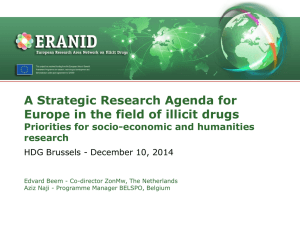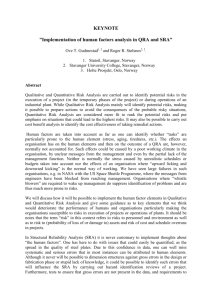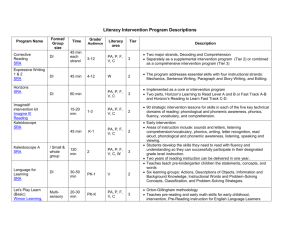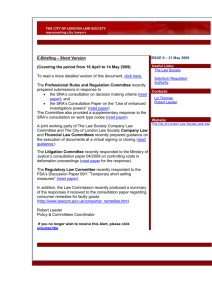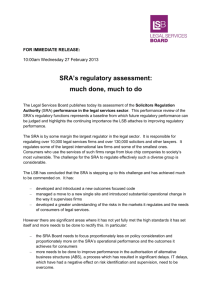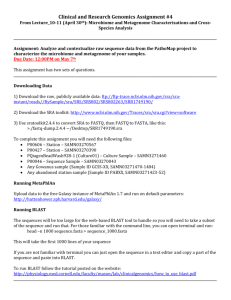SRA Information Technology Pty Ltd
advertisement
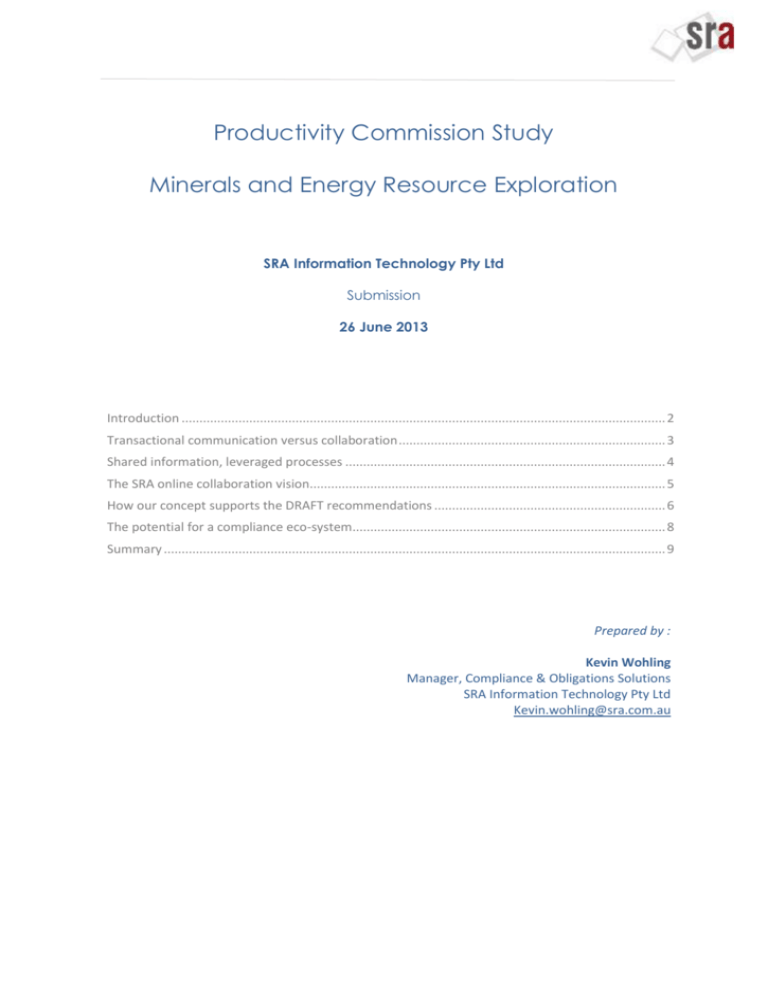
Productivity Commission Study Minerals and Energy Resource Exploration SRA Information Technology Pty Ltd Submission 26 June 2013 Introduction ........................................................................................................................................ 2 Transactional communication versus collaboration ........................................................................... 3 Shared information, leveraged processes .......................................................................................... 4 The SRA online collaboration vision.................................................................................................... 5 How our concept supports the DRAFT recommendations ................................................................. 6 The potential for a compliance eco-system........................................................................................ 8 Summary ............................................................................................................................................. 9 Prepared by : Kevin Wohling Manager, Compliance & Obligations Solutions SRA Information Technology Pty Ltd Kevin.wohling@sra.com.au Productivity Commission Study Minerals and Energy Resource Exploration Approvals Introduction SRA Information Technology Pty Ltd (SRA) is a researcher and developer of approvals and compliance software solutions to both industry and regulators within the Mining & Energy sectors. SRA developed the successful Environmental Assessment and Regulatory System (EARS) for DMP in Western Australia which the industry has heralded as perhaps the best example of helpful tools and transparent processes in the WA resources sector. In South Australia we work with DMITRE and PIRSA, having developed SARIG, the global leader in pre-competitive geophysical databases to which we have recently added Exploration Licence tracking. We also have a long history of engagement in South Australia with Exploration and Tenement Management solutions. In addition we develop a range of solutions for EPA in South Australia, SEWPaC Federally and DME in Northern Territory which offer further insight. SRA is also a successful supplier of environmental management software to corporate mining and energy companies both in Australia and globally. These solutions include modules specifically designed to manage and support development approvals and the resulting compliance obligations. Our client base includes entities such as BHP Billiton, Rio Tinto, Xstrata, Anglo-American and thus deals with a wide variety of commodities and various aspects of exploration, development, production and distribution in every Australian state and in Asia, North America, Europe and Africa. Concerns expressed by our customers and industry contacts recently caused us to analyse project approvals processes to understand how technology might help. For more than a year, we have been discussing approvals processes with regulators in Australia and New Zealand as well as exploration, development and project operators of every imaginable size covering every major commodity. Those discussions reinforce the concerns that are discussed in the Issues Paper published for this review and there is real frustration on all sides driven by a complex set of problems. It is worth stating that we are yet to find a resource company who is not prepared to comply with legitimate environmental, safety and community concerns and we are yet to find a regulator who seeks to prevent responsible development. What we do consistently find is frustration and a degree of what can unfortunately only be described as mistrust from both sides. SRA offers this paper as an information technology specialist’s insight into how approvals processes generally could potentially be improved to achieve better outcomes for industry, investors, community and environment. Any significant change to project approvals processes will have broad implications impacting a wide variety of people and organisations and SRA respectfully submits that any effective change to exploration licence approvals processes will need technology to facilitate change efficiently and effectively. We were therefore a little disappointed that the Draft Recommendations did not more strongly emphasise the role online software solutions could have in resolving many of the concerns relating to information sharing, transparency and engagement. We note that Recommendation 3.5 proposes online capability to offer transparency over regulator assessment timing and Recommendation 6.7 proposes online guidance for environmental issues. We support these recommendations but we think the true opportunity may have been missed given that some jurisdictions already do both relatively well and that the industry concerns in those jurisdictions remain. SRA believes that online software needs to provide the central point of coordination that implements the kind of reforms proposed in the Draft Recommendations more generally. Software should manage the single, objective definition of exploration approvals processes for all parties so that it may facilitate effective communication and bi-lateral transparency throughout. SRA Information Technology Pty Ltd Submission, 26 June, 2013 Page |2 Productivity Commission Study Minerals and Energy Resource Exploration Approvals From an information perspective, SRA believes that there are three primary issues impacting the ability of any given jurisdiction to substantially improve project approvals processes; A legacy of relying upon unidirectional, “transactional” communication between proponents and regulators and between regulatory agencies The lack of a single common forum to share information The inability (or possibly reluctance) of different regulatory agencies across levels of government to share information and leverage each other’s work SRA research and experience has shown that even quite sophisticated and popular solutions such as EARS in WA only accelerate processes to a limited degree because they only relate to a single government department covering a limited range of processes and they do not deliver similar assistance and transparency across approvals required from other agencies. The concepts they apply are proven but the implementation is too isolated. Transactional communication versus collaboration SRA believes that the way regulators and proponents communicate information as they work towards achieving project approvals is based on an out-dated and inefficient communication model. There is an underlying assumption that the criteria to evaluate and approve projects are formal and consistent for each project; or at least, for each similar project type. Permit guidelines specify reports, forms or data that need to be submitted for evaluation by various agencies in a series of stages. In general, these reports are created unilaterally and submitted expecting approval as per the guidelines. In practice, every single exploration project is different. Each project has different implications which will require different focus and emphasis. Even though much of the data submitted may be similar for various approval submissions, it’s unlikely that any two projects will ever be subject to the same approval conditions or that any two projects will ever be rejected for the same set of reasons. This implies that the important outcomes (approval conditions) are largely unknown at the start of the process. In this situation, information provided unilaterally will very probably not meet the expectations of other parties. In practice, the guidelines provided by regulators to describe the requirements for project approvals are non-specific and subject to interpretation. The information submitted in response is inevitably over-engineered in some areas and fundamentally lacking in others. In addition, the various perspectives of different approving agencies and assessment disciplines mean interpretations and emphasis within communicated information begin to vary ever more widely. The resulting poor communication creates inefficiency through repetition and inappropriate emphasis. Industry has long proposed a risk management approach to project approvals to try and overcome some of this inefficiency. We contend however, that the underlying problem is the lack of a collaborative approach to defining how project approval can be achieved. Risk based assessment will provide a method but it will not accelerate project approvals dramatically if it is not based upon a collaborative communication model. Project approval processes need to be collaborative and communication between all parties needs to be interactive rather than a series of transactional document exchanges. Regulator attempts to improve communication have resulted in initiatives such as “Lead Agency” and Case Managers in some jurisdictions to try and make interactions more effective. In practice, these interactions have made it easier for proponents to get answers about the process but they do not often change the way that approval conditions are arrived at or defined. Interaction is still transactional, usually sequential and often repetitive. There is therefore little change to the time taken or the satisfaction with outcomes of interested parties even when this type of assistance is provided. SRA Information Technology Pty Ltd Submission, 26 June, 2013 Page |3 Productivity Commission Study Minerals and Energy Resource Exploration Approvals The Draft Recommendations discuss the need for a variety of more effective interactions throughout the application, approval and management processes related to exploration licences but it does not discuss how it could be implemented. SRA believes that efficient approvals processes will only emerge once there is collaboration between all effected agencies and the proponent throughout the lifecycle of the approvals process. This requires a method of communication and collaboration that supports all participants in that lifecycle. Ideally the objective of that lifecycle will be the definition of approval conditions and NOT approval/rejection itself because this will focus communication on issues that can be resolved collaboratively and transparently. If conditions cannot be met then clearly a project will not be approved but the conditions themselves will be mutually clear and understood at every stage. We believe that this will help to resolve the concerns of both industry and regulators but it will require technology to implement it in a scalable and affordable fashion. Extending this collaboration into management and compliance has incredible potential to facilitate the adaptive management practices recommended in the draft report which, in themselves will simplify exploration permitting by providing a more predictable and transparent compliance regime. Shared information, leveraged processes SRA submits that one of the major impediments to change for exploration licencing is the lack of any central point of understanding and control over the processes themselves. The sheer number of potential parties involved means that no individual or agency has clarity over what is required to gain approval for even the most benign of projects. Formal and informal reviews of the time and effort required for exploration approvals have been occurring for a number of years. Industry submissions have consistently referred to improvements such as risk based assessment, fixed timeframes, binding decisions, accountability and transparency but few have considered how they can actually be delivered holistically. We accept the reasons behind the proposals from both industry and regulators but feel that all will remain idealistic until a mechanism can be created to actually define and manage all of the underlying processes. SRA believes that approvals processes would accelerate dramatically simply by facilitating a more effective exchange of ideas and information throughout a process whose singular purpose is to define mutually acceptable outcomes as required by law, community expectations and operational realities. Objective criteria must be visible and clear so that they may be satisfied quickly and subjective criteria must be managed through conversations that start as early as possible. This requires a “forum” that supports an exchange of information within a managed and auditable framework that will assist “global” and “junior” explorers equally. Only then will a clear understanding emerge of how to deliver positive change in a way that will satisfy legal, social and industry expectations for exploration activity. SRA understands that such a forum will not obviate the need for legal and process change on its own but effective change takes time because it involves people. The amount of time depends largely on having clarity of purpose and the level of motivation and empowerment of people to enact change. History will tell us that when radical change disrupts legal frameworks, precedent and multiple established government agencies all at once, it has little chance of success. We believe that a focus on collaboration will not only improve and accelerate communication but also provide a solution that can facilitate change in a positive, controlled fashion. SRA envisages a software platform that allows people who own a process to refine and improve it within a common online framework. Repetitive, redundant and inefficient tasks will become obvious to all and can begin to be “designed out” and accelerators such as parallel processing can be SRA Information Technology Pty Ltd Submission, 26 June, 2013 Page |4 Productivity Commission Study Minerals and Energy Resource Exploration Approvals created in a continuous improvement model. Simply implementing this across regulatory agencies will target, facilitate and even justify process improvements by making activity more transparent and more measurable. Extending the collaboration to proponents within the same forum has the potential to begin a paradigm shift in how approval conditions can be defined. The solution we envisage is not trivial but neither is it necessarily disruptive any more than implementing any software solution is disruptive. As long as regulatory agencies, individual assessors, proponents and community groups are prepared to share information and collaborate we believe much can be achieved within the constraints of existing legislation in each jurisdiction. Although its success does not depend upon it, we would hope this collaboration might also create empathy and a common understanding among industry, regulators and community groups of what constitutes desirable outcomes and positive change. This has the potential to drive a paradigm shift; progressively moving regulator focus from enforcement to consultation, moving proponent focus from minimising conditions to minimising harm and shifting community groups focus from development prevention to development optimisation. The SRA online collaboration vision The internet has long been used as a publishing medium but its ability to bring people’s ideas and information together makes it an ideal interactive medium as well. Ubiquitous internet connectivity means people are no longer bound by the need for physical proximity or even simultaneous presence in order to communicate. The social media revolution demonstrates interactive communication and collaboration on a vast, somewhat unregulated scale but this can be customised to suit more formal business needs as well. People communicate formally and informally from anywhere, anytime using online software solutions. Communications can be controlled so that they are accessible by many or only a nominated few. They can securely capture and share highly structured data or leverage unstructured information and visual media. These features combined with software’s ability to define and manage processes make an online solution ideally suited to managing project approvals processes. The long held arguments that contributors to approvals processes do not necessarily have internet capability or that the law prevents online communication are long out of date and internet based software represents the logical point of control and delivery method for the types of change mooted for exploration approvals. In fact, given the sheer breadth of expertise and the potential number of contributors, it is difficult to imagine how effective change could be implemented without a common forum that at least brings the various regulatory agencies together. SRA proposes a software framework that supports registered users only. It will allow Approvals submissions and assessments processes to be defined by regulators as repeatable activities with defined contributors, participants, roles and responsibilities. These processes will include decision points and tasks designed to consider legal, community and operator needs within a single forum that ensures all parties have access to the same advice, rule, precedent and law throughout. It is very easy for agencies to link their own processes with other agencies, share responsibilities in a common process and invite input from other authorised users of the system. Modelling and mapping processes need not be undertaken on the kind of scale that would delay implementation in fact, fundamentally, the platform would support existing agencies performing existing processes with little or no change. The difference is that the platform represents a single location for defining the processes, responsibilities, decision points and accountabilities across all impacted agencies. Once in place, proponents will initially register as users of the system so that they can then prepare and collate proposals online using the framework. They would have a single portal which is SRA Information Technology Pty Ltd Submission, 26 June, 2013 Page |5 Productivity Commission Study Minerals and Energy Resource Exploration Approvals controlled by a primary regulator and includes all relevant supporting information, guides, examples and expectations. The power of the solution comes from the ability of different players in the approvals life-cycle to define their own processes and have them managed within an overall hierarchy of processes. The regulator can define workflows and decision points that allow a sequence of tasks to be managed and they can also control the degree of transparency offered to other interested parties during the process. Processes can manage the creation of project proposals and formal documentation can be lodged within an automated process. Regulators can define processes for proponents to use or they can even allow proponents to define their own processes which also allow proponents to determine the degree of transparency they offer to the regulator. This is not a theoretical solution for SRA. Many of these concepts are not even unique in that they have been leveraged in solutions from individual agencies in various States before. The difference with our vision is that the concepts are to be employed across agencies and able to engage both proponents and community in the processes as they mature. SRA has consulted with Minerals and Energy regulators in Australia and New Zealand to turn this into a prototype that demonstrates the above capabilities and much more. Indeed the solution is already much more mature and capable than described in the summary above. New Zealand Petroleum & Minerals are planning to extend the concept to interactive collaboration to manage ongoing industry compliance and reporting; a concept that can simplify the approval itself by also managing the project life-cycle through development, operation and closure in an equally predictable fashion. We thus feel that our vision has been validated and it remains only for the degree of collaboration and transparency to be determined and implemented to drive positive change. How our concept supports the DRAFT recommendations SRA’s online framework concept has the potential to drive change across the spectrum of activities required to achieve exploration licences as demonstrated by the following comments in relation to the recommendations already identified in the Draft Report. DRAFT RECOMMENDATION 3.1 A multi-agency framework provides an ideal mechanism to prepare and publish exploration licensing objectives and assessment criteria. The collaborative workflow-driven process encourages not only publishing but exchange of data between parties. Information such as guide books, references, law, precedent, examples, contact details and any other type of data can be provided immediately adjacent to a step in a process that may require that support. The ability of the process to interact with the proponent provides a mechanism to ensure that feedback is provided in a managed way for all proponents. A software controlled environment means that the creation of the feedback data can even be a by-product of the evaluation process by collecting evaluation comments and concerns throughout both single and multi-agency processes. DRAFT RECOMMENDATION 3.4 The ability to allocate steps or subordinate processes to other agencies would provide a mechanism to publish information sourced from a variety of responsible agencies and the administrations of “related approvals” under a lead agency framework will be simple and transparent. It will support both senior and junior explorers equally whilst supporting the independence of approving agencies and their processes. DRAFT RECOMMENDATION 3.5 The process hierarchy supports the publishing of planned and actual timeframes down to each step in every process if required. SRA proposes that agencies be able to determine the level of granularity that they publish performance data beyond major process steps. Reporting will naturally become SRA Information Technology Pty Ltd Submission, 26 June, 2013 Page |6 Productivity Commission Study Minerals and Energy Resource Exploration Approvals more granular as industry questions timings of steps but agencies need to be able to optimise processes before subjecting them to broad scrutiny. We feel that this will support and encourage managed improvement by the agencies as the solution begins to show process bottlenecks and it allows the framework to be implemented quickly rather than optimising all processes first. DRAFT RECOMMENDATION 4.3 We believe software has a critical role in supporting this vision. A configurable workflow processes will support the collection of ongoing data related to approval conditions and this, in turn will support the evolution of compliance standards in line with evidence. DRAFT RECOMMENDATION 5.2 The proposed framework allows the publication of sensitive information to be controlled by security protocols. The hierarchy of processes allows lead agencies to see that a process step has been completed without necessarily having to see the content provided to satisfy that step. DRAFT RECOMMENDATION 5.3 Configurable workflow processes support the collection of ongoing data related to approval conditions and this, in turn will support the evolution of compliance standards in line with evidence over time. The ability to engage heritage groups in the observance of the compliance data collected supports ongoing collaboration to build trust and continual improvement. DRAFT RECOMMENDATION 6.2 We believe our solution can provide more immediate assistance as well as supporting the process which results from the proposed reform. A single collaborative software process engaging Commonwealth agencies and State agencies will assist in understanding duplicated tasks and information and shared responsibilities until this can be streamlined. Ongoing, the software solution would expose the data to interested parties in each jurisdiction. DRAFT RECOMMENDATION 6.5 Configurable workflow processes support the collection of ongoing data related to approval conditions and this, in turn will support the evolution of compliance standards in line with evidence over time. The ability to record an agreed objective supported by processes that can be progressively refined allows continuous improvement that will manage risk and deliver optimal outcomes. DRAFT RECOMMENDATION 6.6 Configurable workflow processes support the collection of ongoing data related to approval conditions and this, in turn will support the evolution of compliance standards in line with evidence over time. The ability to record an agreed objective supported by processes that can be progressively refined allows continuous improvement that will manage risk and deliver optimal outcomes. DRAFT RECOMMENDATION 6.7 Application processes would be defined online as workflows with decision points that will guide the proponent as to the likely approvals required. All supporting information for each decision point would be located adjacent to the step associated with the decision. DRAFT RECOMMENDATION 6.8 Online application and assessment processes will make the Storage, search-ability and aggregation of data progressively easier. In fact, archived data that can be suitably categorised and is not sensitive could be made available as relevant case history (based on category) to support future proponent applications. SRA Information Technology Pty Ltd Submission, 26 June, 2013 Page |7 Productivity Commission Study Minerals and Energy Resource Exploration Approvals The potential for a compliance eco-system SRA’s ultimate vision extends still further. We envisage that a standard data format could simplify the exchange of approvals and compliance data, link it back to source legislation and precedent and provide a platform that would encourage software developers to progressively create tools to accelerate and simplify tasks. This is where the solution begins to become an eco-system that supports regional variations within a common framework that supports global operators. Ideally such a standard would be consistent globally but Australia has an outstanding record of leadership in defining similar standards for industry and this should be seen as an opportunity to help resolve what is a global problem. Figure 1 - Facilitating communication with a compliance data standard SRA Information Technology Pty Ltd Submission, 26 June, 2013 Page |8 Productivity Commission Study Minerals and Energy Resource Exploration Approvals Summary SRA has witnessed first-hand the difficulties regulators, mining companies and energy companies experience in trying to accelerate exploration approvals. We understand the cost of approvals delays for our customers in industry but we also understand the environmental and community imperatives that must equally be protected. SRA has a vision that all Exploration Approvals processes in any jurisdiction can be defined and managed within a single software solution that embraces the independence of each stakeholder and agency but shares a common infrastructure. Each contributor manages their own processes but has the ability to collaborate and share data with the others. The single overall platform manages data, processes and reference materials securely whilst supporting the kind of transparency that supports continual improvement toward a shared objective. Our vision assumes that there is the political will to change existing silo cultures into a cohesive, shared culture that is focused on outcomes but we believe that any solution that streamlines and accelerates exploration approvals will require that as a minimum. We believe our software driven vision is both an enabler of the cultural change and an enabler of continual improvement that will accelerate project approvals. Regional experiments with siloed implementation of similar systems in Western Australia and elsewhere have shown us that change in exploration approvals will require a pervasive, consistent communication forum that allows all parties to contribute in a managed but transparent interaction. It is the breadth of involvement of different parties in shared processes that becomes the critical success factor. Since regulators define what data is recorded and managed they hold the key to a quantum leap in improving industry performance regards environmental, social and economic responsibility. If Approvals and Compliance data could be defined in a consistent standard independent of regional law and administrative structure, industry will begin to create solutions that support all regions and thus rapidly improve performance through consistency and continual improvement. SRA acknowledges the complexity involved in optimising something as broad as exploration approvals but we are confident that we have identified and validated at least some key elements that will be required and some of those elements are, at their core, simple and highly achievable. SRA would like to thank the Commission for the opportunity to offer this submission. We would be delighted to expand upon the discussion herein and share our project approvals experiences in Australia, New Zealand and globally with the Commission. Kevin Wohling Manager, Compliance & Obligations Solutions SRA Information Technology Pty Ltd Kevin.wohling@sra.com.au SRA Information Technology Pty Ltd Submission, 26 June, 2013 Page |9

